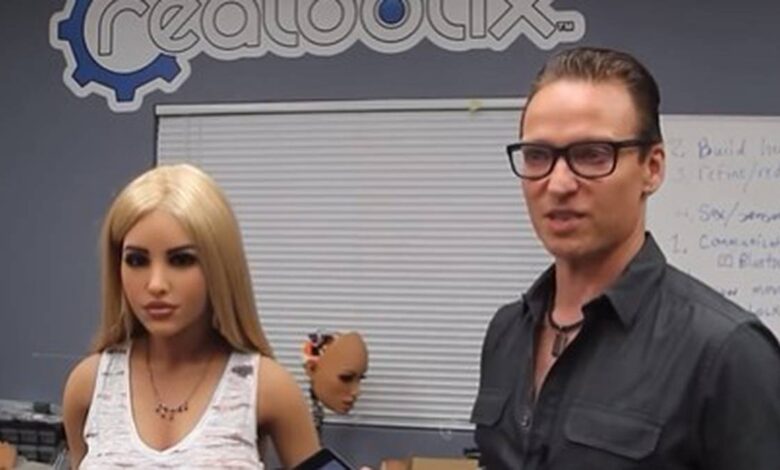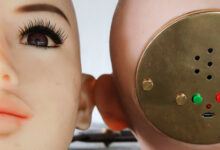Bizarre detail in blonde ‘sex robot’

Realbotix CEO Matt McMullen explaining how the company’s – at the time – newest sexbot Harmony 2.1 worked. Photo / Twitter
An old video of an sex robot talking with a distinctly Scottish accent has resurfaced online, prompting a new wave of interest in the “sextech” industry.
The clip, dating from 2017, features Realbotix CEO Matt McMullen explaining how the company’s – at the time – newest sexbot Harmony 2.1 worked.
The footage quickly went viral after being posted by pop culture page Barstool Sports, with the AI’s Glaswegian accent leaving Twitter users in stitches.
Naturally, Glasgow natives were surprised by the specificity of the robot’s voice.
“American sex dolls with a Glasgow uni accent who woulda thought it,” posted one.
“Why’d they give her that accent? The next train at platform 1 will be – the – 12.15 – to – Glasgow Central,” said another.
While lighthearted, the video has shone a light on the growing AI sex industry, with the past half-decade seeing seismic advancements with techno intimacy.
The 2022 Harmony Doll has 20 personality traits available, including shyness, kindness, insecurity, jealousy, humour and happiness.
Current models are also programmed to learn about users’ families, hobbies and, of course, sexual preferences, with the ability to simulate hyper-realistic conversations.
A murky future
As demand for sexbots surges worldwide, the storm clouds of ethical conundrums are gathering.
Simulated physical reactions are becoming more realistic and visceral, with internal and external sensors currently being updated to more accurately respond to human contact.
Realbotix will also roll out their first-ever male doll, Henry, later this year (and for the record, he will have a British accent).
However, “fake” sexual partners tailored to the fantasy of the user has opened up a Pandora’s box, with increasing concerns held by experts around the prevalence of bots made in the image of children.
Researcher and engineer Christine Hendren from Duke University told the BBC that “some robots are [purposely] designed to look like children”, while others were “programmed to protest and create a rape scenario”.
“One developer of these in Japan is a self-confessed paedophile, who says that this device is a prophylactic against him ever hurting a real child,” Hendren said.
“But does that normalise and give people a chance to practise these behaviours that should be treated by just stamping them out?”
Australia has no laws regulating or prohibiting intercourse with robots, although the Commonwealth, South Australia and Queensland have placed restrictions on robots that pertain to be minors.
Speaking on ABC’s Q&A in 2018, social commentator Vanessa “Van” Badham also warned that opting for encounters with androids over humans could ultimately lead to deepening isolation for many people.
“You have a phenomenon in Japan of people getting older and older without having sexual relationships, without forming partnerships or families because their lives are dominated by work,” she said at the time.
“If you provide somebody with a sex robot and say that you can have this instead of a relationship, you’re furthering that loneliness and that sense of isolation.”
One thing is for certain – regardless of the ethical question marks, the sextech revolution is in full swing and turning enormous profits, with the industry deemed to be worth an estimated A$30 billion in 2019.
The onset of the global pandemic further boosted the industry, with some companies recording up to 125 per cent increases in traffic during lockdowns.
Experts have tipped sexbots to be able to walk, talk and simulate real day-to-day relationships in the near future.
However, you’ll need to pay between A$5000 and A$15,000 if you want to try one of the robots out yourself.
You can read the full article from the source HERE.
-
Sale!

Aurora: Tender Sex Doll
Original price was: $2,799.00.$2,599.00Current price is: $2,599.00. Buy Now -
Sale!

Dominique: Thick Sex Doll
Original price was: $2,499.00.$2,199.00Current price is: $2,199.00. Buy Now -
Sale!

Auburn: Red Head Sex Doll
Original price was: $2,199.00.$1,899.00Current price is: $1,899.00. Buy Now






